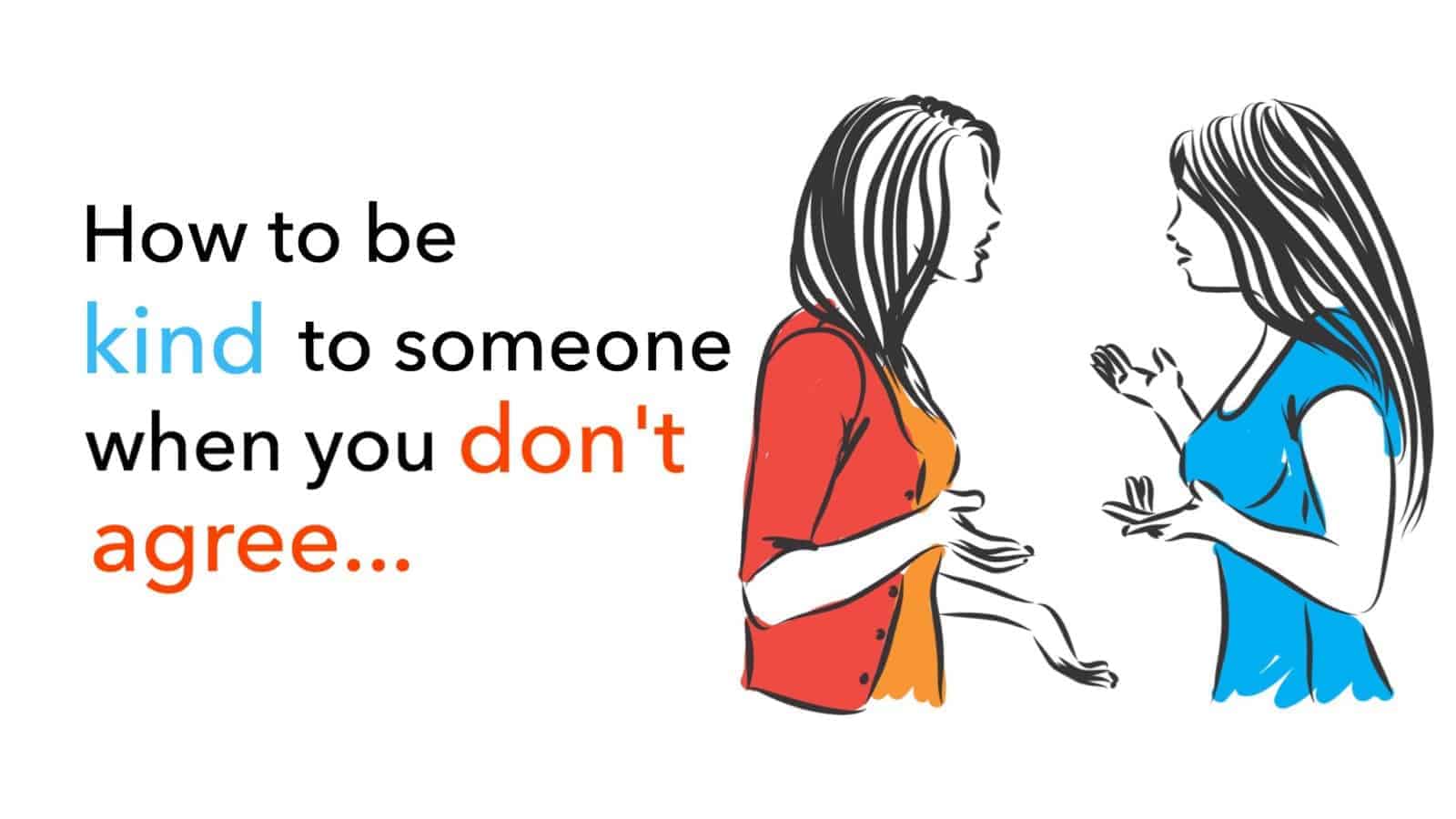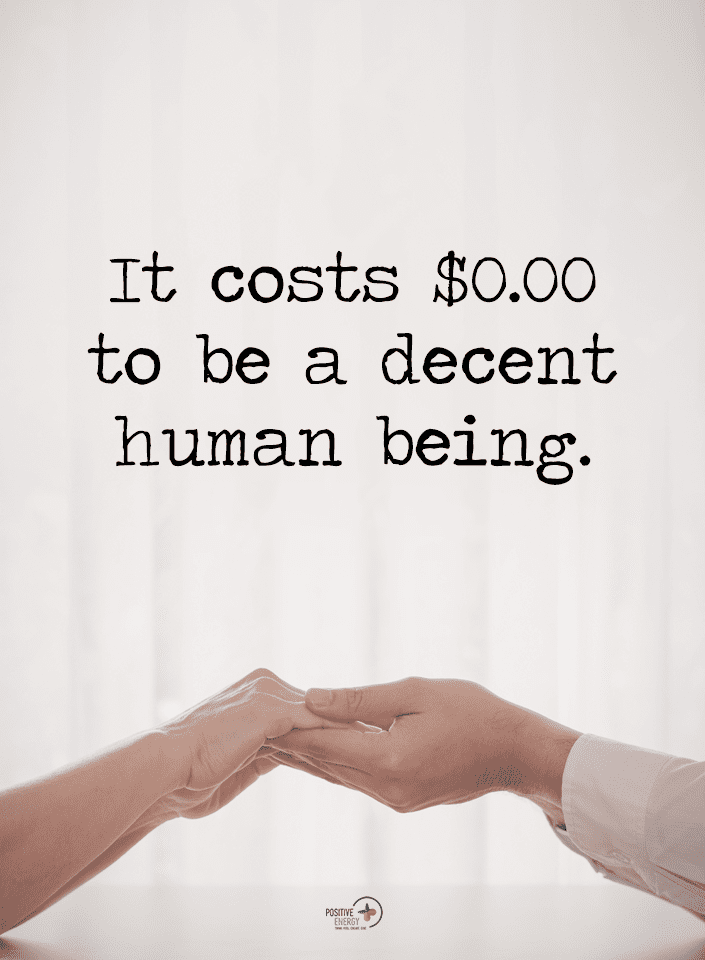Do you know what Albert Einstein once said? He said, “I think the most important question facing humanity is, Is the universe a friendly place?” This is something to think about–because not everyone knows how to be kind when they don’t agree. On all of our many walks through life, we may find that we meet so many people with unique thoughts, ideas, opinions, and life experiences. Combined, all these things often determine how a person feels on a certain subject.
Because we also come from our own life experiences, opinions, thoughts, and ideas, we may find that we don’t agree with everyone we meet. Which is fine, we don’t have to! Unfortunately, we may find that we fundamentally disagree on some things with the people in our life that we can’t just walk away from – friends, family, lovers. It’s good to practice being kind to someone that you, ultimately, don’t agree with, whether their opinions be political or social.
“When we treat someone with kindness, she’s more likely to show kindness to the next person she encounters; the same goes for insensitivity,” says Civility expert Lew Bayer.
Here Are 5 Ways To Be Kind To Someone Even In Disagreements
“Be kind, don’t judge, and have respect for others. The world would be a better place if we can all do this. The point is to teach this to the next generation.” – Jasmine Guinness
1. Listen with an open mind
One of the things that cause us to stop being kind to someone we disagree with is the fact that we sometimes close ourselves off from listening to them. We may already decide what they think and feel, making it easier for us to close ourselves off to what they’re actually saying. A great way to keep the kindness is to learn how to listen to them with an open mind.
“Open-mindedness is equated with positivity and growth. It helps us to take risks, find opportunities, understand others, and manage uncertainty. We also see open-minded people as more generous and kind,” says Kristi Hedges, a leadership coach, speaker and author.
Listen to what they’re saying so you can disagree with what they think and feel, not what you’ve convinced yourself that they think and feel! Who knows, you may find that you were misinterpreting them all along.
2. Think before you speak
Would you feel very good about yourself if you disagreed with someone and they spoke to you with vitriol? Would you want to listen to whatever else they had to say next? Chances are, you’re shaking your head ‘No’. Instead of allowing yourself to say something cruel, imagine how you would like to be treated in a conversation where you and the person you were speaking with disagreed. Talk to them as you would want to be spoken to. It’ll help you stay calm and kind.
Relationship expert Amy Sherman says, “Remember, words have a way of connecting people or dividing them. Your choice of words can prevent a heart from breaking, a friendship from ending, or a feud from brewing. Let your words be a source of comfort, support, encouragement, peace, and love. You’ll be a better person because of it.”
Think before you speak and you may find that you can come to an agreement on your differing opinions.
3. Find common ground
Instead of starting every conversation with the things you fundamentally disagree with, find some common ground that you can agree on. This will help you see the things that are the same about you, rather than continuing to focus on the things that are different. Finding common ground means that you’ll both be able to listen to the validity of each other’s opinions without automatically tossing them out. After all, if you agree on one thing, you may find that you can agree on other things.
4. Remember the positive feelings you have towards each other
If you fundamentally disagree with someone close to you, like a family member or a close friend, it can be easy to let the negative feelings overwhelm you. Instead of letting yourself focus on how you feel negatively towards them because of the differing opinion, focus on the positive emotions that you feel towards them.
“…in a circular way, when another person gets the feeling that you don’t really see much that’s good in him or her, that person is less likely to take the time to see much that’s good in you. Seeing the good in others is thus a simple but very powerful way to feel happier and more confident, and become more loving and more productive in the world,” says psychologist Rick Hanson, Ph.D.
Therefore, you can feel love and affection towards someone while disagreeing with them. You just have to take time out to focus on those good, positive feelings instead of letting yourself drown in negative ones.
5. Learn when to walk away
Sometimes, the kindest thing you can do is to learn when the debate is getting too much, and it’s time to table the discussion. This doesn’t mean storming out of the room or ignoring the other person. Rather, you need to learn when you’ve reached your limit and can no longer engage in the conversation in good faith. And that’s okay! We all have our limits! Once you learn to recognize when enough is enough, you can table the debate or discussion for another time when you’re both feeling more calm and rational to continue it. Learning when to walk away can ensure that you don’t damage any relationships you may have with people you disagree with.
Final thoughts on responding in a kind way when people disagree
It doesn’t feel good to disagree with someone you care about. Unfortunately, we can’t all have the same opinions as our friends, family, or even our significant others. What we can do is respect their opinions, and respect them as human beings. Part of that respect comes with learning how to be kind, even when you’re in the middle of a disagreement. This makes going through life a lot easier for everyone involved.


















